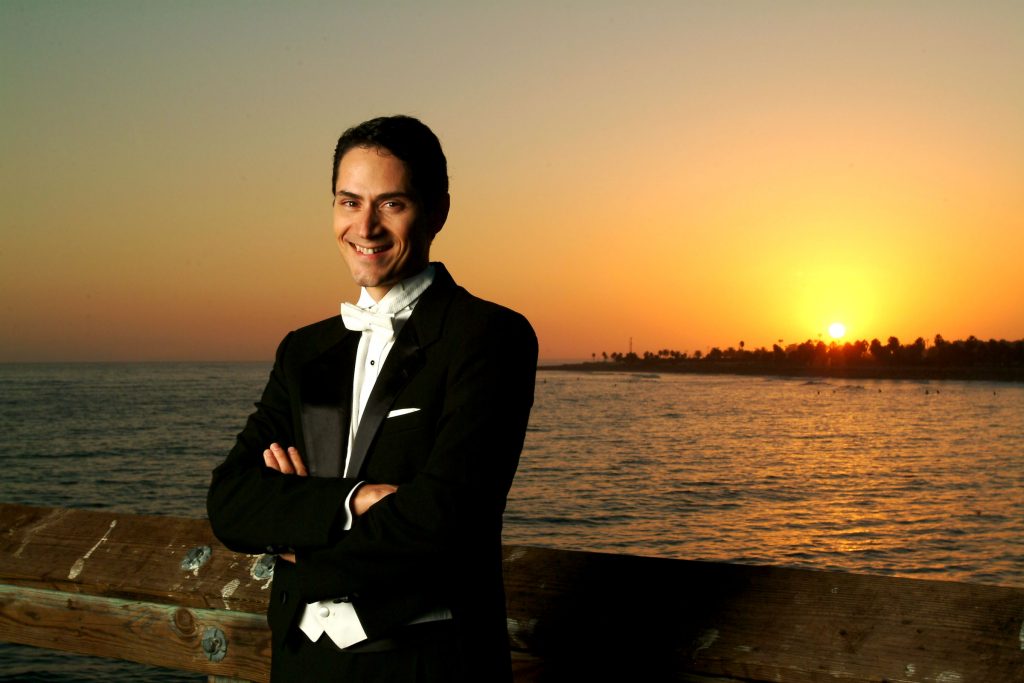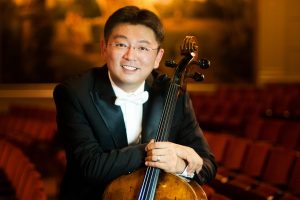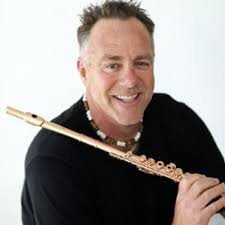San Diego Symphony Nearly Blows the Roof Off Copley Symphony Hall
I must be getting old.
I always thought…no, I was convinced that Anton Bruckner was just some fat, Austrian nebesh who probably had bad breath and fungal toe nails, along with a horrible self-image and episodes of severe and debilitating depression. I just figured that I and everyone else hated his music because it sucked.
Oops! Got that one wrong! And thanks to Nuvi Mehta’s deft, fluent and highly informative pre-concert talk along with the San Diego Symphony’s utterly masterful performance of Bruckner’s Symphony #8 in C minor on Saturday night, I am a newly minted “Brucknerian”. Under the efficient albeit histrionic conducting of outgoing Music Director Jahja Ling, the band nearly blew the roof off Jacobs Music Center’s Copley Symphony Hall.
In three of the four movements, the woodwinds played to near perfection with seamless hand offs between they and the strings. The brass players were on fire as well as on point, sensitively balanced with the rest of the orchestra by the conductor. The implementation of rotary valve trumpets added a nice touch, being the perfect choice with their warmth and volume for Bruckner’s late Romantic orchestrations. I do not recall ever hearing Wagner tuba playing to rival Saturday’s performance: rich, full toned, with expert ensemble and spot-on intonation, played with nobility and dignity. Each string section played effectively and with particularly good intonation, although fatigue set in by the last movement causing some ragged moments.
The result of all this virtuosity was impressive and highlighted the music’s internal logic and clarity. The water-tight ensemble playing served to elucidate the composer’s equally tight developmental technique. Past performances I have heard have left me with a sense of inadequacy: since I was never able to follow the developmental flow of the part writing, I naturally concluded that either Bruckner simply lacked compositional skill or I had lousy ears.
My relief at being wrong in my arrogant assessments was palpable and I actually felt a personal sense of gratitude to everyone involved with Saturday’s submission for illuminating this magnificent music.
Perhaps the single most clarifying aspect of this concert, however was Mehta’s lucid and revelatory explanation of Bruckner’s obsession with what is termed motivic compositional technique. This refers to the art of writing music in such a way that all of its melodies and even its harmonies are integral and related to a very small number of usually melodic ideas, or “motives”. In the contemporary Vienna of his time, Bruckner was esthetically associated by the press and much of the public with the Wagnerian camp, in contradistinction to the Brahmsian one. Despising Wagner, his music and his supposed ideals, Eduard Hanslick, one of the most powerful critics and taste makers in the second half of the 19th century, was manifestly opposed to Bruckner’s music, believing that his compositions were far too closely aligned with the master of Bayreuth.

Nuvi Mehta (used by permission, San Diego Symphony)
The truth of the matter is that Bruckner was as profoundly influenced by the strictly non-programmatic compositional technique of Brahms and his associates as he was by the Wagner/Liszt programmatic orthodoxy. This reality, expostulated by Mehta in his lecture, creates a new passageway into Bruckner’s music for the listener, showing that one needs to listen to Bruckner sui generis. The fact is that the composer utilized all the rich, chromatic advances of Wagner and Liszt while maintaining compositional unity through a near obsessiveness in his motivic usage in the manner of Brahms. A further, distinguishing revelation comes by reckoning Bruckner’s insistence upon composing four measure phrases, unlike Wagner OR Brahms. All this information served to give every listener in the hall an opportunity to experience a transcendent, cogent, musical experience through the aegis of this rarely played masterpiece.
Describing any of Bruckner’s major works as “massive” is about as unimaginative as describing the sound of footsteps in the snow as “crunch”. Yet, at over eighty minutes, this monumental edifice of art taxes every facet of performance. The listener’s ability to track with the piece is stretched to the limit due to the overwhelming structural proportions, the musician’s stamina to perform intensely for eighty minutes is challenged severely and the music requires that the conductor maintain the intense concentration of a fighter pilot under enemy attack. The greatest of all the challenges, however was met by the composer himself whose skills were tested to its very limits to maintain a convincing musical statement. He obviously overcame his challenges heroically.
The work has the weight of leviathan and is fraught with technical and compositional challenges. Its successful presentation is truly a titanic struggle for all parties concerned. Its difficulties rank it among the most demanding of works to pull off, regardless of historical period. Somehow, despite these enormous difficulties, Saturday’s performance was a nearly unalloyed success.
One misfortune of the evening was that by the fourth movement, everyone was exhausted. Musicians’ phrasing suffered as a consequence, minor intonation arguments went unsolved and phrase endings became a bit ragged. All of this is understandable and in a sense forgivable given the scope of the work and its herculean demands.
The other “misfortune” was the inclusion of Haydn’s Cello Concerto in C with the Symphony’s principal cellist, Yao Zhao. Programming this lovely concerto with Bruckner’s Eighth Symphony is nothing short of enigmatic. It neither holds any particular affinity to the Symphony nor did it significantly add to the allure of the program. One had the sense that the

Cellist Yao Zhao (photo by Beth Ross Buckley. Used by permission, San Diego Symphony)
players also did not feel any sense of urgency in their rather humorless performance. Zhao is a substantial virtuoso with an impressive technique and compact sound. His fine interpretation nevertheless left one unfulfilled, perhaps in part due to his colleagues’ apparent disengagement from the work. They probably had their minds on what was to follow after the intermission. Finally, the concerto’s inclusion in the program lengthened it by eighteen or so minutes, making it even more difficult by the end of the Bruckner for the audience and the musicians to maintain the requisite attention. The work probably should have been left off the program and kept for another time.

Yochanan Sebastian Winston, Ph.D. has performed throughout the United States, Europe and Latin America. His repertoire spans classical, jazz, klezmer, new age, contemporary, rock & roll and pop and is very active as a composer. Dr. Winston holds a Ph.D. from the UCSD, a Diplôme from the Conservatoire National de Region de Boulogne-Billancourt (France), and a Master’s and Bachelor’s of Music from the Manhattan School of Music in New York City.
